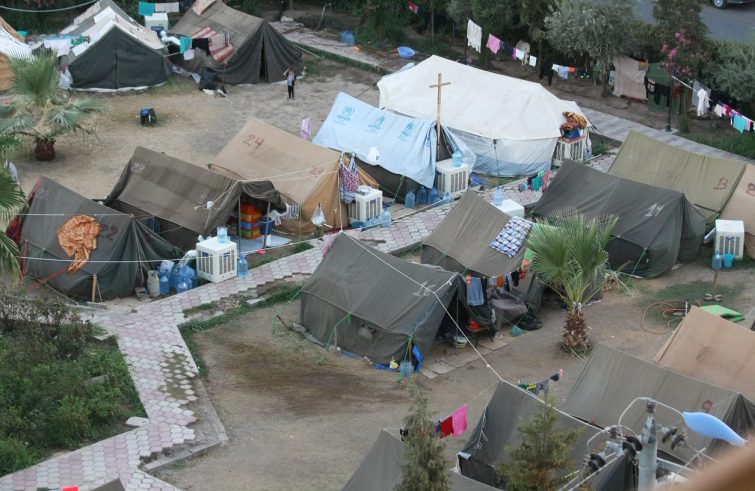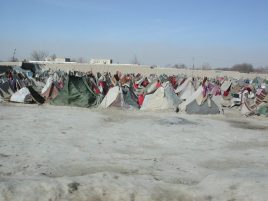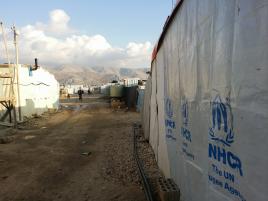
A refugee Church, made up of Christians forcibly displaced from their homes, cities, towns. The Report released by Open Doors entitled “Refugee Church” highlights a poorly known situation and the connection between religious persecution of Christians and the plight of internally displaced persons or refugees. In fact, trefugees’ countries of origin and countries notorious for violating religious freedom in the world are closely intertwined. The global picture of religious persecution, reads the Report, invariably offers a partial perspective if the Church is merely regarded as static, for religious persecution “does not necessarily stop at borders.” The Report – published ahead of World Refugee Day ( June 20), coinciding with UNHCR’s latest data indicating the global number of forcibly displaced persons at 100 million – denounces the “deliberate strategy of forcibly displacing Christians from their homes and communities, aimed at eradicating Christian presence from regions with the highest degree of persecution.” According to the Report, Christians in 58 of the top 76 countries on the World Watch List (WWL), (listing high, very high or extreme levels of persecution faced by Christians, Ed.’s note) report being forcibly displaced from their homes because of their religious identity – either as the sole or aggravating factor. In the context of displacement, reads the Report, psychological violence and physical insecurity are challenges faced by all IDPs and refugees, but form and intensity may vary in response to their Christian faith and practice. These include different kinds of situations, government officials, members of different communities, violent religious groups targeting displaced Christians. A person’s age, gender, religion of origin, ethnicity and social status determine the intensity and form of persecution experienced.
 What causes Christians to flee? Globally, four main factors cause Christians to flee: “family pressure: in many cases, those who converted to Christianity reported being ostracised by their families, subjected to death threats and to such pressure that they saw fleeing as the only option. State pressure: government officials at national and local levels have the power and resources to inflict harm on Christians, including legislation targeting blasphemy, marriage and freedom of assembly.” “Community pressure” is also a factor: in addition to the family, the local community may constitute a strong and continuing source of pressure, especially since it often controls access to community resources.” The fourth factor involves the presence of violent religious groups: “in several world countries, violent religious groups continue targeting and terrorising religious minorities such as Christians, frequently in an attempt to eradicate them from the region where they are based. Such violent groups flourish in contexts marked by conflict, insecurity and lawlessness.”
What causes Christians to flee? Globally, four main factors cause Christians to flee: “family pressure: in many cases, those who converted to Christianity reported being ostracised by their families, subjected to death threats and to such pressure that they saw fleeing as the only option. State pressure: government officials at national and local levels have the power and resources to inflict harm on Christians, including legislation targeting blasphemy, marriage and freedom of assembly.” “Community pressure” is also a factor: in addition to the family, the local community may constitute a strong and continuing source of pressure, especially since it often controls access to community resources.” The fourth factor involves the presence of violent religious groups: “in several world countries, violent religious groups continue targeting and terrorising religious minorities such as Christians, frequently in an attempt to eradicate them from the region where they are based. Such violent groups flourish in contexts marked by conflict, insecurity and lawlessness.”
Regional analysis of the root causes. According to the Report, the countries with the highest rate of Christian refugees/ internally displaced persons (IDPs) in Sub-Saharan Africa are Cameroon, the Democratic Republic of Congo (DRC), Eritrea and Nigeria. Violent religious groups, most often Islamic extremists, such as al-Shabaab, Boko Haram, Islamic State in Africa Province, represent high-risk environments for Christians, who are victims not only of physical and sexual violence, but also of attacks on their property, livestock and land. In the Middle East and North Africa, Syria and Iran are the countries creating the largest number of Christian refugees/internally displaced persons. Those who leave their country for faith-related reasons in particular, are Muslims who converted to Christianity. For them, the primary threat could come from family members and communities of origin. Moving on to Asia, “Afghanistan, Myanmar and Pakistan register the highest number of Christian refugees/internally displaced persons. Here too, the main sources of pressure driving people to abandon their homes are their family members and the local community. Great pressure is exerted on converts to Christianity from another religion. Such pressures are especially evident in Pakistan, where religious minorities live under the threat of laws against apostasy and blasphemy.” Political instability and the rise of extremist religious groups has fuelled displacement in the region, notably in Myanmar. Thousands of people have been forced to flee to neighbouring countries, or have become internally displaced. These include minority groups such as the Rohingya. In the large-scale displacement of the Rohingya (the majority of whom are Muslim) from Myanmar to Bangladesh, a small number of Christian converts face an increased level of vulnerability on account of their faith. In Latin America, Christians are the main victims of insecurity and crime. Although all community members are affected by the presence of criminal gangs and activity, the most actively involved Christians – especially religious ministers – are specifically targeted if their faith prompts them to speak out against the power of local mobs or to evangelise members of these gangs. When indigenous Christians in Mexico and Colombia convert, they lose their right to have a voice in the community.
The impact of displacement. The challenges of working with a transient and strongly heterogeneous population, the Report says, make the identification of faith-related violence all the more complex compared to when marginalised religious communities are in their context of origin. Therefore, “a full picture of religious persecution requires looking at both the Church in one’s homeland as well as the Church being displaced,” says Helene Fisher, Open Doors global gender persecution expert. “Part of this deliberate strategy is to divide religious communities. Displacement is not just a by-product of persecution, in fact, in many cases, it forms part of a strategy to uproot Christianity from the community or the country as a whole.” The long-term impact of displacement, according to Open Doors, could dramatically change the face of a country for generations. By way of example, there were more than one million Christians in Iraq before Saddam Hussein came to power. Now they number only 166,000. The number of Christians declined during his rule, yet persecution in the region increased sharply after 2003, and the pressures peaked in 2014 with the emergence of ISIS.
 Appeal. In response to the hostility, to the marginalisation and vulnerabilities that refugees face because of their faith, Open Doors calls on the international community – among other things – to “ensure the integration of the principles of Freedom of Belief and Religion into all anti-discrimination programmes designed to protect and promote the rights of refugees; to guarantee meaningful participation of refugees fleeing religious persecution in the planning, evaluation and implementation of targeted refugee programmes and interventions, and to include religion as a vulnerability factor in all assessments concerning refugee assistance programs.” Moreover, local religious organisations, in both host and home countries, must be involved in efforts concerning refugee protection and assistance. Finally, host countries must uphold the non-refoulement principle enshrined in the 1951 Convention and the 1967 Protocol. According to Eva Brown, Senior Specific Religious Persecution Analyst at Open Doors, “In some cases, governments as well as well-intentioned international organisations may regrettably become complicit in exacerbating discrimination against displaced Christians. For this reason, multi-level awareness of this vulnerability is critical to addressing the needs of displaced and marginalised refugees.”
Appeal. In response to the hostility, to the marginalisation and vulnerabilities that refugees face because of their faith, Open Doors calls on the international community – among other things – to “ensure the integration of the principles of Freedom of Belief and Religion into all anti-discrimination programmes designed to protect and promote the rights of refugees; to guarantee meaningful participation of refugees fleeing religious persecution in the planning, evaluation and implementation of targeted refugee programmes and interventions, and to include religion as a vulnerability factor in all assessments concerning refugee assistance programs.” Moreover, local religious organisations, in both host and home countries, must be involved in efforts concerning refugee protection and assistance. Finally, host countries must uphold the non-refoulement principle enshrined in the 1951 Convention and the 1967 Protocol. According to Eva Brown, Senior Specific Religious Persecution Analyst at Open Doors, “In some cases, governments as well as well-intentioned international organisations may regrettably become complicit in exacerbating discrimination against displaced Christians. For this reason, multi-level awareness of this vulnerability is critical to addressing the needs of displaced and marginalised refugees.”









